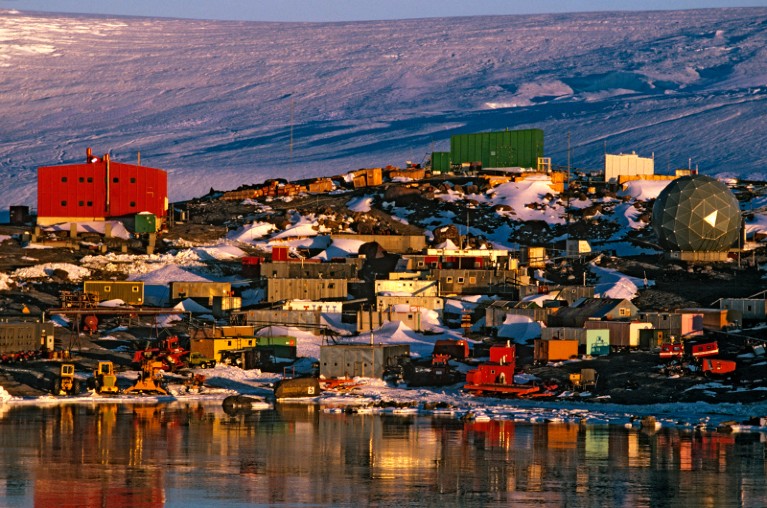Hello Nature readers, would you like to get this Briefing in your inbox free every day? Sign up here.

Mawson Station, one of the Australian Antarctic Division’s bases on the icy continent, will be run at a reduced staffing level in the summer of 2023–24.Credit: Auscape/Universal Images Group via Getty
In the wake of record-low sea ice in Antarctica, scientists worldwide fear that crucial research will be disrupted because of looming budget cuts at the Australian Antarctic Division. Two of Australia’s three permanent research bases on the icy continent will not be staffed at normal summer capacity in the coming season. “It’s just a terrible blow for the science,” says palaeoclimate scientist Nerilie Abram.
Nature | 6 min read
Scientists can eavesdrop on the music people are listening to by analysing their brain waves. Artificial intelligence helped to reconstruct audio from brain activity patterns that were recorded in 29 people who already had electrode implants because they had epilepsy. The reconstructed version of the song that the participants were listening to — Pink Floyd’s 1979 song ‘Another Brick in the Wall, Part 1’ — sounds distorted and the lyrics are garbled, but it’s discernible if you know what to listen for. The results could help to create better ‘speech prosthetics’, which translate brain waves into speech. As to their choice of song, “the scientific reason is that the song is very layered”, says neuroscientist and study co-author Ludovic Bellier. “The less scientific reason might be that we just really like Pink Floyd.”
Scientific American | 5 min read
Reference: PLoS Biology paper
Thanks to several unpopular changes to Twitter, now known as X, scientists are reconsidering their use of the platform. More than half of 9,000 respondents to a Nature survey said they have reduced their time spent on Twitter in the past six months. Just under 7% have stopped using it altogether, and roughly 46% have joined other social-media platforms, mostly Mastodon and LinkedIn. Many worry that they will lose the sense of community that Twitter had fostered, particularly for researchers from under-represented groups. “I’m 99% convinced that Twitter, as we know it, is dead, and the sooner academics accept that, the better, in terms of finding solutions to these problems,” says sociologist Mark Carrigan.
Nature | 9 min read
Features & opinion
Table of Contents
The private sector’s role in a greener future is key, as noted in several of the 17 United Nations Sustainable Development Goals, which Nature is profiling at the halfway stage to their 2030 deadline. But all too often, net-zero commitments in business and finance are tarnished by spin and greenwashing. Vague targets must be jettisoned in favour of robust, accurate, verifiable numbers, argues a Nature editorial. The Bridgetown Initiative, a plan spearheaded by leaders in Barbados, could help to corral the necessary capital to move things forward.
Nature | 5 min read
A survey of researchers who published in predatory journals — which charge fees and provide little to no peer review — offered surprising insights into why they did so, writes information scientist Chérifa Boukacem-Zeghmouri. “I was shocked by how adrift many authors seemed when faced with the workings of scholarly publishing,” she says. “Many were not aware that they had fallen prey to a predatory publisher.” Others recognized the fraud too late or were bullied into paying up. “Research institutions are falling down on the job of providing basic education in scholarly publishing norms”, she argues, leaving scientists vulnerable to the pressures of ‘publish or perish’ culture — especially in low- and middle-income countries.
Nature | 5 min read
Algorithms will need to become up to ten billion times more energy efficient to crack three of the biggest computing problems: planet-wide weather modelling, real-time emulation of the human brain and simulation of human evolution. “Performing small-scale human evolutionary simulation at the digital limit using solar energy would, for instance, require us to cover most of Europe with solar panels,” write artificial-intelligence researchers Alexander Conklin and Suhas Kumar. They outline what could help, including innovative approaches to computing, highly efficient energy sources (such as nuclear fusion), and funding from massive corporate and inter-governmental conglomerations.
Nature Electronics | 12 min read
Today I’m remembering Mohammed Yahia, who was instrumental in the development of the Arabic-language version of this Briefing, as well as the launches of several global editions of Nature and Scientific American. He was also a past president of the World Federation of Science Journalists. He has died, aged 41.
Mohammed offered boundless warmth and encouragement to his colleagues, and a commitment to rigorous science journalism in a sometimes extremely challenging environment. “The thing that makes science so special is that it is one of the last few tools we have as humans that can inspire curiosity, ignite passion, and empower every individual,” he wrote in June. “It provides us with reason for hope.”
Thanks for reading,
Flora Graham, senior editor, Nature Briefing
With contributions by Gemma Conroy and Katrina Krämer
We’ve recently launched two new e-mails you might like. They’re free, and of course you can unsubscribe at any time.
• Nature Briefing: Cancer — a new weekly newsletter written with cancer researchers in mind. Sign up here to receive the next one.
• Nature Briefing: Translational Research covers biotechnology, drug discovery and pharma. Sign up here to get it free in your inbox each week.
